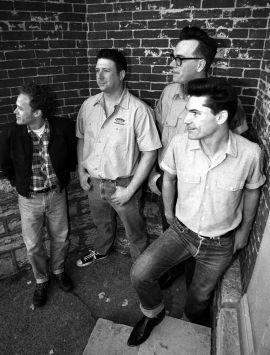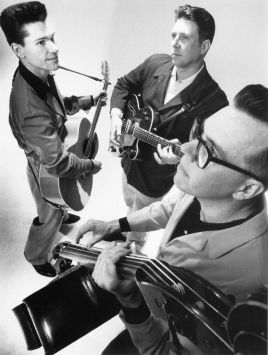social bookmarking tools:
 |
|
| Available RSS Feeds |
|---|
 - Top Picks - Top Picks |
 - Today's Music - Today's Music |
 - Editor's Blog - Editor's Blog
|
 - Articles - Articles
|
Add Louisville Music News' RSS Feed to Your Yahoo!
|

CROWN ELECTRIC:
A RETRO-SPARK FROM ROCK AND ROLL'S ROOTS
By Tim Roberts
I'm first at the stoplight. It's a cool, clear night on the eve of autumn. I'm on my way home from an interview with Crown Electric, the rockabilly trio from Lexington – lead singer and acoustic guitarist Michael Tevis, lead electric guitarist Bob Burriss and upright bass-slapper Frank Turner. Joined by Charlie Bissell, their graphic artist/webpage designer and former bandmate of Bob's, they drove into the city from Lexington to me meet me at the Twig ‘n' Leaf. That's a small diner that serves as an anchor point for the Douglass Loop, the small business district in Louisville where Bardstown Road intersects with the tree-heavy Douglass Boulevard and Dundee Road.
The Loop is one of the few places in the city where you can go to the bank, get a haircut, pick up a few t-bone steaks and a loaf or two of bread, grab your dry-cleaning and get a pound of homemade fudge all in a single trip down one short block – just like it was in the epoch before shopping centers and behemoth malls. The Twig ‘n' Leaf is a narrow and long structure, all tile, chrome, Formica, wood and glass. Bacon-and-egg breakfast platters and hamburgers painted on the large front windows. Out in front, a die-cut neon sign in the shape of a large leaf held by a small twig. Quaint and nostalgic, it was an appropriate place – in an appropriate neighborhood – to meet with Crown Electric. Named after the company Elvis worked for in Memphis, this is a band whose sound is rooted in the traditions of early rock and roll, tinged with country with just a pinch of swing.
A heavy engine roars behind me. Impatient upper beams flash twice. My eyesight goes white for a moment, then returns. In my rear-view, polarized for night driving to reduce glare, the tops of two headlights shine like twin moons rising. In my side mirrors I glimpse an older car – maybe a '55 or '56 Chevy Bel-Air coupe, two-toned orange and white.
The light turns green. I make the turn into my neighborhood. The Bel-Air hugs my bumper, revving its engine. I stop at the next intersection. The Bel-Air rolls close. I turn left, accelerate, check my rear-view. The Bel-Air squeals its tires in a tight U-turn and roars back onto the highway. I instantly think of "End of the World," an intense song from Crown Electric's debut release Rockabilly Opera about a non-committing guy slamming down a highway in his car after abruptly severing a relationship with a woman, driving to squeeze her from his memory, to escape, as mile markers pass him by "like broken hearts." It was an oddly appropriate finale for an evening spent talking with a trio of musicians who maintain the clean, simple, direct sound of rockabilly from more than 40 years ago – when the car that briefly tailed me was almost new – the music that grew into today's rock and roll.
* * *
"It's a rhythmic, high-energy kind of sound," said Mike Tevis describing the Crown Electric style of playing, "with a really cool guitar tone and plenty of solos."
The Twig was closed, so we had settled on a late dinner at El Nopalito, a small Mexican food place about four miles east of the Twig, operating out of the shell of a former Taco Bell location. The lack of nostalgic atmosphere didn't affect the conversation, so we started by talking about rockabilly and its divergent sub-genres: traditional, psychobilly, swingabilly.
Guitarist Bob "Tone King" Burriss said, "Rockabilly draws from many different elements to begin with: American country music, American rock and roll, soul - "
"Rhythm-and-blues," Frank added.
"Gospel," said Mike. "Where the beat comes from."
" – and since we've gone through so many more styles and genres of music, people may grow up on a certain style. For psychobilly it might be punk, and they'll draw that into the rockabilly sound."
"We're more on the country side of rockabilly," said Mike. "We're a workin' man's rock and roll band."
Or, as their press materials state, 21st Century Rockabilly.
In this massive, messy time-warp of fast-fading retrocultures, with the simultaneous coexistence of swing, Rat Pack throwbacks, martini-and-cigar lounges, ‘70s funk-and-dance, and psychedelia, Crown Electric is sturdy and authentic. Not that many of their fellow retro-rocker colleagues aren't. The Blue Moon Boys from Fort Wayne, Indiana, perform the same style of music with spicy lyrics and a high dose of frenetic energy. Or even the psycho-billy performers like the Reverend Horton Heat and the Reach Around Rodeo Clowns, who fuse the hard-edged sounds of punk rock with the strum and twang of the older sound.
But Crown Electric is the band you'd take your parents to see at the VFW hall. They are the ones you'd ask to play your at your sister's wedding reception.
They perform onstage in retro-rocker clothing: Mike in a work shirt and cuffed jeans, "Spankin'" Frank in heavy horn-rimmed glasses and checkered shirts with starched, white cuffs, Bob in a relaxed, loose shirt looking as if he'd just come from coaching a little-league team. Their part-time drummer Jon McGee adds a nice touch to their stage presence: the head of his kick-drum was once on a marching-band bass drum at Glasgow High School and has a drawing of a majorette in its center.
"We get more comments on that drum than anything else," Bob said. "Plus Jon's got his own definite way of playing it."
Charlie asked Bob, "How did you describe [his playing]? A set of drums going down a hill but in perfect time?"
If you had to tag the members of Crown Electric with arbitrary traits (The Shy One, The Loud One, The One With The Hairy Wart On His Temple, none of which apply to Crown Electric's kernel trio, incidentally), Jon is The One With Long Hair. While Bob just keeps his short, both Frank and Mike have theirs pulled up high, tight and as flat as parking lots on top. Jon's must work better when he plays with another Lexington-based band: Taildragger
"He's also one of the funniest people you'll ever meet," added Bob.
So why no regular drummer? Or, rather, why a "bullpen of drummers" as Mike described them?
"The band originally got together as a recording project," Frank explained, "to record songs Mike had written. Jon was the guy we wanted on drums. We eventually turned into a performing band, and every drummer that we play with is in at least a couple other bands. Nobody's free enough to just come in to play with us exclusively."
"Lexington is a small musical community, so we share members a lot of times," Mike said.
"And all the guys we play with are definitely A-list players," said Bob. "That's why they're so busy."
With the music scene in Lexington being as intimate as it is, with its count-on-one-hand number of clubs and bands that share musicians, the story of how Crown Electric came together sounds like the steps involved in putting together Mr. Potato Head: one basic unit where parts are added, taken away and new parts alter its appearance until you find something you like.
"I met Bob a few years ago," Mike said, "while I was running sound and doing a little bit of open mic at Lynagh's in Lexington. We jammed maybe once or twice. Then a few years later I formed Crown Electric, but it had different members and it didn't have an upright bass player. That little group dissolved, so I took some time to write some songs. Then I found Frank, who lived half a block away from me and played upright bass, which I always wanted in a band."

Mike jammed with Frank and found they clicked well with each other. The next step was to find a guitar player. Fred Sexton was first, but ended up playing lap steel guitar instead, joining them for a few tracks on Rockabilly Opera. Then Bob joined the band.
Each member is a long-time performer. Mike (who was born in Norfolk, Virginia, birthplace of Gene Vincent) left his Lexington home when he was 17 and moved to New York, where he formed a band called Traindriver (which is also the title of a spiritual on Rockabilly Opera). That band performed in four sets a night at a club in Greenwich Village. He returned to Lexington in 1989 and took a job booking bands (including Jimmy Dale Gilmour, John Hammond, and the Planet Rockers from Nashville, which the band claims as a huge influence on them) and running sound at Lynagh's. He quit to pull together the Crown Electric project.
After graduating from Seneca High School in Louisville, where he played bass in the school orchestra, Frank Turner attended University of Kentucky. He started playing in various bands after graduating, ranging from punk (Fat Acid) to rockabilly (The Humdingers). His day job is a court records researcher with the Lexington Herald-Leader.
Hailing from Flatwoods, Kentucky (north of Ashland on the Kentucky's border with West Virginia), Bob had played in several different types of bands, including, back in the late 1980s, one called O'Dark 30 (with their webpage designer Charlie Bissell) that performed proto-alternative music that was then branded as "college rock."
"That was the first band where I got a taste of playing out of town a little bit," he said. "It was the first [for me] that was developed into something more than just a garage band." He later became part of a country dance band in Ashland, playing three to five nights a week. When a period of economic distress smashed into Ashland after the closing of a steel mill, Bob and his wife moved to Lexington. He became part of a blues band that performed at Lynagh's, where he met Mike.
Their cumulative experience and love of the music they play has resulted in an appreciative following in their home base Lexington, Louisville, and as far south as Atlanta. They were one of the non-Louisville-area featured bands at this past summer's Louisville City Stage, the weekly celebration of Louisville Music (the other was Richmond's Supafuzz). Another result of their passion is, of course, Rockabilly Opera, their debut CD.
Released on Louisville's Rollin' & Tumblin' Records, it's a 13-song collection of originals and covers of rockabilly standards.
"It took 15 years to make," Mike joked.
The rest of the band laughed and nodded. "It did take about a year and a half," he said.
Bob explained. "The reasons were many, but mostly we had the idea of making an all-analog recording."
"For a bigger, warmer sound," Mike added.
"So we searched for a perfect combination of equipment and environment."
They found Al Fresco's Place, where they worked with Jeff Carpenter over a period of several months, making several trips to and from Louisville.
"Initially we started just doing a four-song demo," Mike said. "But the more we listened to it, we decided to just go on and do a whole album. We made endless trips back and forth to track and re-track. We were pretty inexperienced and learned as we went. But we knew what we wanted it to sound like."
"Then in the middle of our project, the studio shut down," said Bob.
Jeff Carpenter and his wife had a baby, then the studio moved. "We were down for about three months," Frank said. "Just about anything that could happen, did happen."
"But we never got a flat, though," Mike reminded his bandmates.
* * *
On August 30, three weeks before I interviewed Crown Electric at El Nopalito, I watched their performance at Headliners Music Hall. They opened for a swing band called The League of Decency. Many in the audience were in swing attire: guys in pleated pants, two-toned shoes and wide ties, women in clingy, spaghetti-strap gowns. Surprisingly, Crown Electric's sound jelled well with the atmosphere. Several danced to some of the band's faster selections and even brought them back for an encore. Yet among the band there's a sense that they are not too comfortable being co-opted into a fad.
"We have noticed an element of campiness in this whole swing thing," Bob said.
"We have certainly have benefited from it," Frank added.
"We want to be able to take advantage of the trend," Mike said, "but still stay a little outside the camp. No pun intended. We're not zoot-suit swing. Hillbilly swing is what we do, and that somehow doesn't seem to fit under the swing umbrella."
"It's kind of opened people's eyes to the fact that there are other types of American rock and roll than what you hear on pop radio," Bob said. "And swing has been a good vehicle to tell people that it's okay to like something a little off the mainstream."
But, as Frank and Mike both stated, swing has become the new mainstream, the inevitable assimilation of all things branded "alternative." Everything unique gets sucked up into the mainstream faster than a paper towel after spilled milk until it becomes like everything else.
"I don't like the corporate manufactured sound in today's music, the cookie-cutter songs," Mike said. "They just churn them out in Nashville or L.A., using the same session musicians, the same producers - "
"A lot of times, the same songwriters," Bob injected.

"So it becomes hard to distinguish one singer from another because there's no individuality. People say rock is dead. But rock and roll with never die. It's a musical art form that's passed down. It's the business of rock and roll that needs a total shake-up from the ground-floor up."
While the business rolls out its monthly gallons of froth, the men of Crown Electric are making plans for keeping rock – and their band – alive.
"One of our goals for the next few years," Mike said, "is to come up with a new album, then take that and our self-produced first release to a bigger label and producer and see what happens there. And since we're establishing ourselves on the Internet, and getting around the region, we're also getting our name out."
"We have a little bit of international distribution," said Bob, "and we've heard very positive feedback from countries like Finland."
"We're huge in Finland," Frank exclaimed.
"That's another one of our goals," Mike said, "to go over to Europe and play."
"Charlie and I have both lived in Europe for a period of time," Bob said. "[American music] is as happening there now as it was here two decades ago. People there are really into the live shows. Everybody gets pumped up about it."
"Americans have lost that, I think," Charlie said.
"Yeah," Bob continued. "It's so available over here. It's like cheese."
There is a tendency to forget that the music that came to us almost fifty years ago wrenched a staid society from its complacency and, therefore, became dangerous. It moved fast, moved feet, moved merchandise. Over time it replicated slightly different versions of itself, borrowing from other forms, then those versions spun off their own. It eventually became product to be marketed, and watered-down, and made to overcome buying objections by Mr. and Ms. Modern Shopper and their 1.35 children.
Bands like Crown Electric, with their traditional, clean sound, precise musicianship, and confidence in what they are doing, are earthy reminders of rock's past, without the candied remember-when sentiment.
They are reminders of a spark that ignited the world.
* * *
Crown Electric's next performance will be on December 17 at the Historic Kentucky Theater in Lexington, where they'll open for BR-549. They will also have their version of Mabel Scott's Christmas classic "Boogie-Woogie Santa Claus" on a benefit CD assembled by Lexington's Ace Magazine. Proceeds from the disc's sale will benefit the Women and Children's Fund.
Crown Electric invites you to visit their website at: http://www.geocities.com/sunsetstrip/backstage/9581/.
